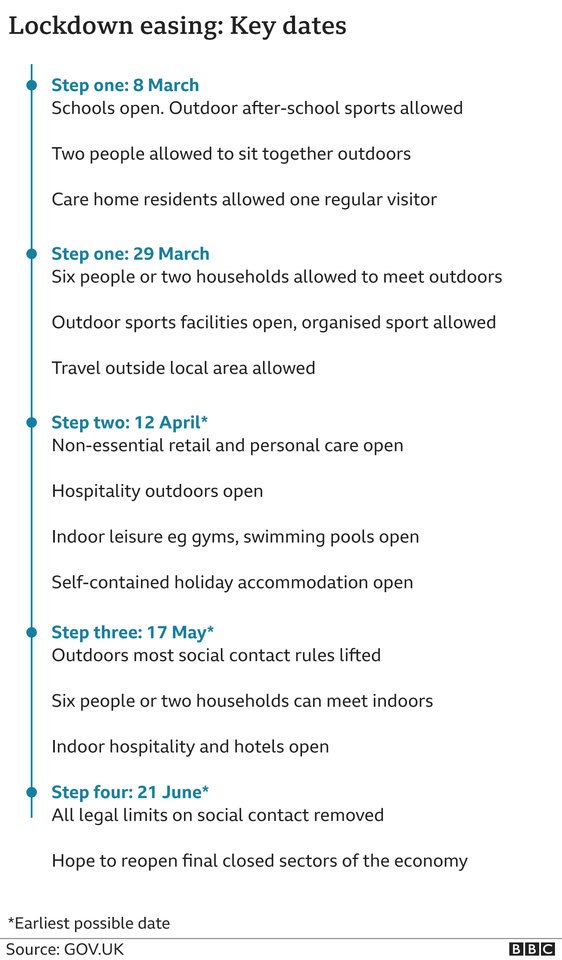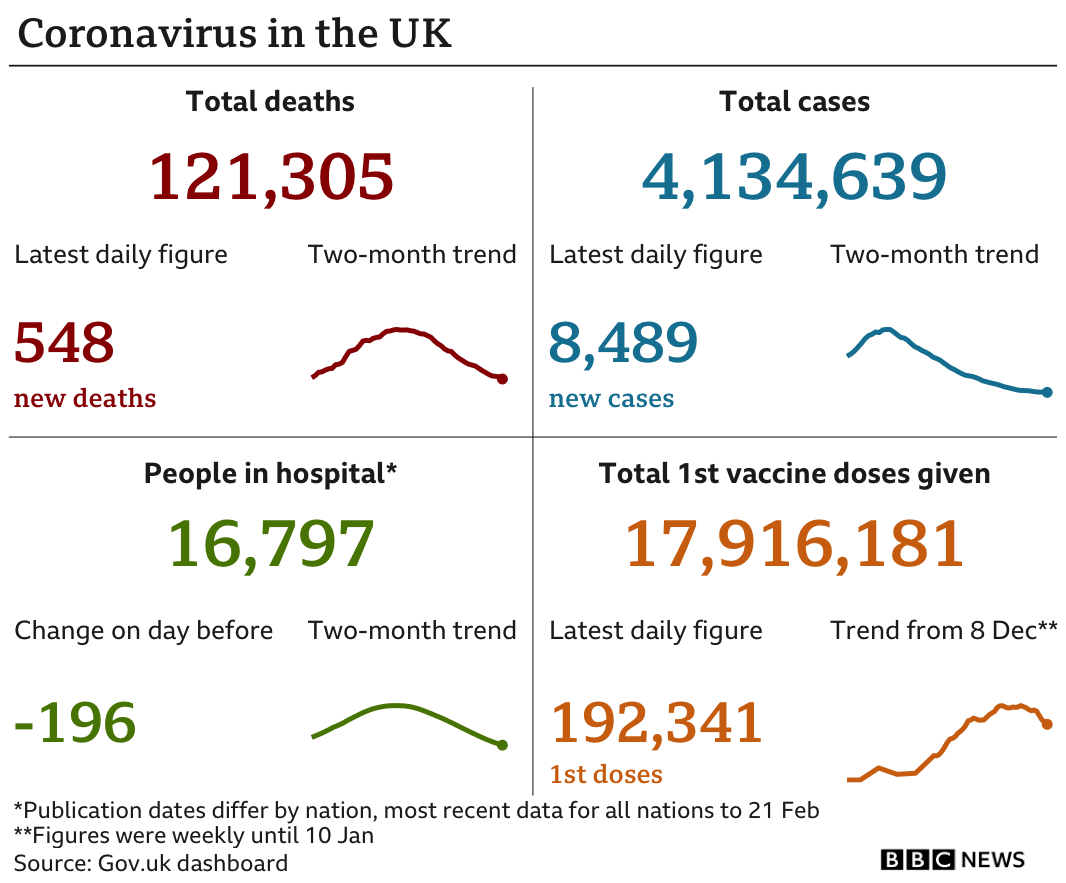There are "deep and complex issues" with using vaccine passports or certificates to prove someone's Covid "status", Boris Johnson has said.
Announcing a review of the proposal, he said using certificates to allow visits to venues such as pubs and theatres was a "novelty for our country".
Cabinet Office Minister Michael Gove will lead the review.
Mr Johnson said he was "very optimistic" most Covid restrictions in England can be lifted on 21 June.
Vaccine passports have been discussed by countries, including Greece, and operators such as Saga Cruises, as a way to safely reopen international leisure travel.
But ministers have frequently appeared to dismiss introducing a similar scheme domestically within the UK for hospitality or leisure activities.
It comes as Scotland's First Minister Nicola Sturgeon has said - if all goes to plan - she expects to see a phased but significant re-opening of the Scottish economy in the last week of April.
A further 8,489 coronavirus cases were recorded across the UK on Tuesday and 548 more people have died within 28 days of a positive test - taking the total by that measure to 121,305.
More than 17.9 million people across the UK have now received at least one vaccine dose, according to latest government figures.
Speaking during a visit to a south London school, Mr Johnson said the UK had "never thought in terms of having something that you have to show to go to a pub or a theatre".
He said there were "ethical issues" about the role of government "in mandating… or banning people from doing such a thing".
He added: "We can't be discriminatory against people who can't have the vaccine, there might be a medical reason, or some people may genuinely refuse to have one - I think that's a mistake."
But the prime minister said it was possible to consider the issue at the same time as the rollout of the vaccine.
It is understood the review will not just consider vaccination history alone, with the possibility of negative Covid tests being recorded to gain access to some events or services, if required by the organisers.
One option could see the NHS app used to record both, with an individual then able to show their status on the app if required.
The government previously said it would consider how to facilitate Covid certificates for people who needed to travel to other countries which demanded them.
The review's findings are hoped to be available before the final stage of England's lockdown easing on 21 June, the earliest date by which ministers hope most Covid measures can end.
BBC political correspondent Jessica Parker said the review marked a change of position from ministers but that, with businesses already looking at ways they could keep workers and customers safe, the government was looking to get ahead of things.
"The conversation was just happening anyway. Businesses were looking at ways to make their workplaces safe, organisations were looking at ways to try to make their customers safe and the government risked not being part of that conversation but eventually being brought into it anyway," she said.
Global framework
A No 10 spokesman said an international consensus needed to be built on how to allow greater foreign travel, which the UK was seeking to achieve via the G7 and other multilateral discussions.
"It will be for different countries to determine their own regimes in relation to the quarantine and who they want to allow in, and we want to try and work together to get some sort of international framework," he said.
Greek tourism minister Haris Theoharis told the BBC last week that early technical discussions were under way with UK officials about how a potential passport scheme might work.
Saga Cruises announced last month it would require all travellers to prove they had received two vaccine doses before departure.
"You will be required to bring the vaccination document and/or evidence with you as proof at the time of boarding," its website said.
Holidays in the UK or abroad are not currently permitted under coronavirus restrictions.
Transport Secretary Grant Shapps said a review of how to return to international travel while managing risk from imported cases and virus variants would report on 12 April.
Meanwhile, holiday firms and airlines have reported a surge in bookings since plans for easing lockdown in England were unveiled on Monday.
Labour shadow chancellor Anneliese Dodds told the BBC a review of vaccine passports was "sensible" but said it should be "conclusive" and consider all the evidence available.
Christopher Dye, professor of epidemiology at Oxford University, told the BBC that vaccine passports would "certainly be helpful in releasing the lockdown" but they should not "make things worse for people of lesser means".

Mr Johnson said his roadmap for easing lockdown measures, laid out on Monday, was "a cautious but irreversible approach".
Due to the vaccine programme, the country could "look at that 21 June date with some optimism".
Mr Johnson said each phase of unlocking restrictions - such as children going back to school - would be "adding to the budget of risk".
This is why time was needed between measures to "observe" the impact, he added.
Earlier, Health Secretary Matt Hancock said he wanted measures to become a "matter of personal responsibility and social norms" that could see people choosing to wear masks on public transport.
The devolved nations have the power to set their own restrictions.
Outlining her own roadmap, Ms Sturgeon said she hoped to end stay at home restrictions from 5 April in Scotland.
Meanwhile in Wales, First Minister Mark Drakeford has said he hopes the country's "stay-at-home" requirement could end within three weeks, with some non-essential shops and hairdressers possibly reopening at the same time.
Northern Ireland's First Minister Arlene Foster wants its executive to discuss the reopening date for schools following Mr Johnson's announcement in England.
















